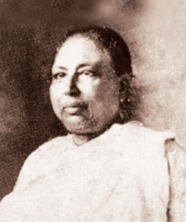| Haimabati Sen | |
|---|---|
 | |
| Born | Haimabati Ghosh 1866 Kulna district, Bengal Presidency, British India |
| Died | 5 August 1933 |
| Other names | Haimabati Ghosh Mitra Sen |
| Occupation | Physician |
| Spouse | Kunjabihari Sen (m.1890) |
Haimabati Sen (1866 – 5 August 1933) born Haimabati Ghosh, was an Indian physician.
Early life
Haimabati Ghosh was born in the Khulna district, Bengal Presidency (now Bangladesh). Her father was a zamindar, a wealthy member of the Kulin Kayastha caste. As a very young widow, she trained as a teacher in Benares. After her second marriage, she attended the Campbell Medical College in Calcutta, and graduated at the top of her class in 1894.
Career
Sen was a physician at the Lady Dufferin Women's Hospital in Hooghly from 1894 to 1910, and had a private practice in Chinsurah, until her death in the early 1930s. She wrote a "valuable" memoir in the 1920s, detailing her own struggles and her concerns for all young women: "Do I have to suffer all this simply because I am a woman? Would anyone have inflicted so much suffering on a man? Why are they so worried as to whose wife I am or whose daughter?" Her memoir was translated from Bengali and published in English many years later, in 2000.
Personal life
Haimabati Ghosh married twice. She was first married at age 9, to a widower with two daughters; a year later, she was a child widow. Without the support of her husband, parents, brothers, or in-laws, she sought assistance at a widows' house in Benares, and joined the Brahmo Samaj community. In 1890, she married again, to Kunjabehari Sen. They had five children together. Haimabati Sen died in 1932 (or 1933), in her sixties.
References
- Subodh Kumar Sengupta & Anjali Bose (2016). Sansad Bengali Charitabhidhan Vol.I. Sahitya Sansad,Kolkata. p. 883. ISBN 978-81-7955-135-6.
- ^ Sen, Indrani (2012). "Resisting Patriarchy: Complexities and Conflicts in the Memoir of Haimabati Sen". Economic and Political Weekly. 47 (12): 55–62, quotes from pages 55 and 57. ISSN 0012-9976. JSTOR 23214502.
- ^ Forbes, Geraldine Hancock (2005). Women in Colonial India: Essays on Politics, Medicine, and Historiography. Orient Blackswan. p. 146. ISBN 978-81-8028-017-7.
- Mukherjee, Sujata (5 January 2017). Gender, Medicine, and Society in Colonial India: Women's Health Care in Nineteenth- and Early Twentieth-Century Bengal. Oxford University Press. doi:10.1093/acprof:oso/9780199468225.001.0001. ISBN 978-0-19-946822-5.
- ^ Chattopadhyay, Anjana (2018). Women Scientists in India: Lives, Struggles & Achievements (PDF). National Book Trust, India. ISBN 978-81-237-8144-0.
- "Book on India's premier women doctors". The Hans India. 17 October 2019. Retrieved 19 October 2020.
- Sen, Haimabati (2000). The Memoirs of Dr. Haimabati Sen: From Child Widow to Lady Doctor. Roli Books. ISBN 978-81-7436-090-8.
- "Haimabati Ghosh Mitra Sen". Oxford Reference. Retrieved 19 October 2020.